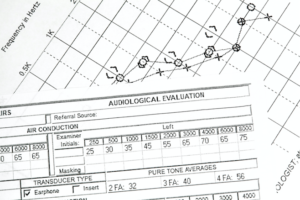Severe hearing loss can impact your life dramatically. Not only can it make it more challenging to communicate with others, but it can interfere with your professional life as well. You might be wondering: is hearing loss a disability? Depending on its severity, it absolutely can. Today, we will explore when the Social Security Administration gives a disability benefit to individuals with hearing loss.

At what point is hearing loss considered a disability? Here’s what you need to know.
Hearing Evaluations
To determine whether or not your hearing loss counts as a disability, you will need to schedule a hearing evaluation. The evaluation needs to be completed by a licensed otolaryngologist, or ENT. Alternatively, an audiologist or even a physician can perform the test, so long as it’s done under the supervision of an ENT. For testing purposes, your hearing aids must be removed.
They will generally begin with a pure tone hearing test, for which you must raise your hand or press a button when you hear a sound of varying volumes and tones. Then they will move onto a bone conduction test, which bypasses the outer and middle ear. You will be eligible for a disability benefit if your air conduction hearing threshold is 90 decibels or higher, and 60 decibels or higher for bone conduction.
Alternatively, the ENT may use a different kind of hearing evaluation: a word recognition test. As you might have guessed, this tests your ability to repeat back words against various background noises. The SSA will consider your hearing loss a disability if you cannot repeat back 40% of the words in this form of test.
Further Considerations
Now, let’s go into a few other considerations you should keep in mind when determining if your hearing loss is a disability.
For one, keep in mind that these tests need to be performed on your better ear. Even if you are completely deaf in one year, you will not be eligible for a disability benefit from the SSA if the other ear’s hearing loss has not progressed beyond the threshold we mentioned above.
The Social Security Administration will also take into account your current employment status and your employment history. If your hearing ability does not interfere with your ability to complete work and earn a living, then you may be found ineligible for the benefit. As a metric of this, they will determine if you earn $1,190 or more monthly. If you do, you will not quality no matter how advanced your hearing loss is.
Contact Bay Area Audiology Today for Hearing Evaluations
Ready to do something about your hearing loss? Our Doctor of Audiology, Dr. Trisha A. Bents Muth, is exceptionally experienced in the art of audiology, and provides the absolute best solutions. Bay Area Audiology has been working to give patients a comfortable environment with thorough evaluations. We are independently owned, and unbiased when it comes to finding you the care you need.
You can always come into the office or contact us in advance to set up an appointment. We also provide updates on our social media websites. You can check out our Facebook, Twitter, LinkedIn, and Pinterest to keep up with Bay Area Audiology.
Don’t hesitate–we can help.
